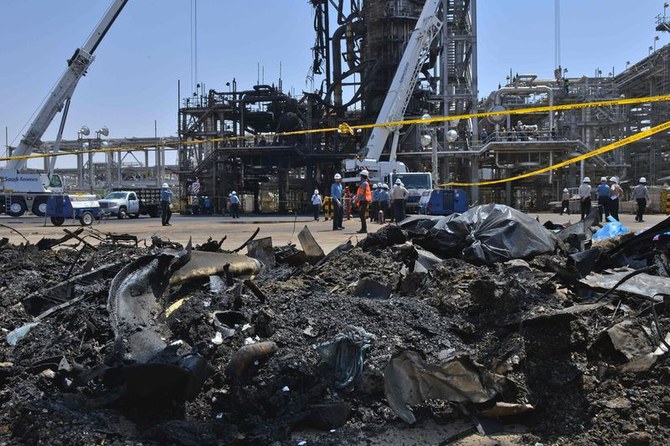The search for answers in light of Iranian aggression

The region has been in a state of restructuring for years; everything in it has been fighting for survival or change, and the Iranian regime is one of the factors in this change — or, rather, a pickaxe of demolition. Iran’s attack on eastern Saudi Arabia has escalated the conflict to a more dangerous level, so we need to see the full picture. This article is part of the daily discussions and dialogues that I have heard here in the region.
Does the attack on the Saudi oil facilities open up a new war front? The attack was a declaration of war from Iran, but it is not necessarily a new front if the required deterrent balance is secured, including Washington’s pledge to send defensive forces to prevent Iranian attacks or make them less costly. The question is a military-technical one: Can high-tech attacks be monitored and deterred?
Iran is now changing its fronts. In the past, it was fighting from afar, through the Houthis in Yemen. It failed to force Saudi Arabia’s hand with missiles and drones that targeted Riyadh, Jeddah, Taif, Jizan, Najran and other areas, most of which were intercepted. However, the Abqaiq and Khurais attacks showed a new level of Iranian aggression against Saudi Arabia and the whole region, and a dangerous international adventure. Therefore, the desired balance, if successful, would foil Tehran’s strategy of depriving its opponents of oil by destroying facilities and hijacking tankers.
Is the Saudi response to the Iranian attack late? We recall how previous crises were dealt with. After Saddam Hussein invaded Kuwait in August 1990, the response came only in January of the following year. It took five months to secure international legal cover and build a military alliance. Despite the pressure, decision-makers do not want to make hasty decisions without taking into account all the possibilities and trying to secure a strong response with minimal costs. Iran has little to lose. As an oil-producing country, it has used its entire savings to build a war state. The six Gulf countries fear for their industries, services sector and modern cities, and they refrain from military confrontations unless they are forced to act in self-defense.
The Gulf countries refrain from military confrontations unless they are forced to act in self-defense.
Abdulrahman Al-Rashed
There are those who point to Russia and say that it helped Iran in the attack because it benefited from it. Is that logical? If Iran had no history of aggression, the search for an instigator to blame would have been reasonable. In fact, Russia has not benefited from the Iranian attack. Saudi Arabia managed to compensate the oil shortage within a few days, thwarting Iran’s goal of depriving the world market of its principal source of oil and raising its prices.
The rewards for Russia and other oil-producing countries from a three-day drop in production were minimal. Skeptics may see that Moscow wants to besiege Washington in its traditional spheres of influence, such as the Gulf, and this seems a logical motive in the conflict of the two powers. However, if you look carefully, we can see the opposite. The Iranian attack brought Riyadh and Washington closer together, not the other way round. Even a Republican leader at odds with Riyadh, Sen. Lindsey Graham, lined up with Saudi Arabia and called for a military attack on Iran. Moscow has not benefited from the Iranian attack, at least at this stage, but it has reduced Russia’s room to maneuver.
What about Washington? Could it somehow be involved in a bid to expand the circle of fear in the Gulf and increase its arms sales? Conspiracy theories usually “tickle” simple logic. Washington has no interest in supporting an attack that cripples half of Saudi Arabia’s oil production because it raises prices, which weakens the US economy and threatens President Donald Trump’s chances of re-election. In fact, it is Iran that wants to raise the price of oil, force its rival out of the market and press Trump to lift the US embargo. Moreover, US arms sales to Saudi Arabia are much lower than agreed because of opposition to the Trump administration in Congress. The attempts in Washington have been to reduce the armaments of the Kingdom, not double them.
What about the costs of the new confrontation that Riyadh will incur and Trump has talked about? Well, there are no “free” wars, as most old and new alliances have been paid for; even Arab partners expect to be compensated financially. Yet, money remains the cheapest cost of war.
- Abdulrahman Al-Rashed is a veteran columnist. He is the former general manager of Al Arabiya news channel, and former editor-in-chief of Asharq Al-Awsat. Twitter: @aalrashed









































